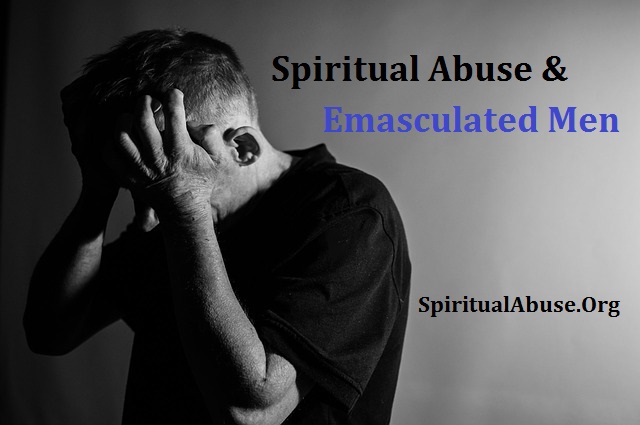A topic that often comes up in our support groups is how women are usually hit harder than men in spiritually abusive churches and groups. It often is mentioned in conjunction with ‘holiness standards‘ and submission. The subject arose once more a couple days ago and in reflecting, I was reminded of some things that married men have shared through the years, a topic that can be difficult for them to discuss. There are men who feel emasculated by the teachings of these churches and how the pastor basically takes their place as the husband. It has been asked, “How many women are having an emotional affair with the pastor and church because their husband can’t quite measure up?”
It seems to happen more often when the man isn’t part of the church or once was but left, or he attends but doesn’t fall in line with all the teachings. However, it also strikes men who are fully immersed in the group. As one shared, “The implied message was that it is more important to be dedicated to the church than it is to your husband. …I didn’t know that the pastor was also married to my wife…strange. Or that he was one of the heads mentioned in the scripture.”
This mindset places tremendous strain and pressure on a marriage and works to emasculate the husband, depriving him of his role and causing him to feel replaced, almost unwanted at times, and less than a man. In situations where there are children, sometimes the wife, and even other family members in the church, will say negative things to the children about their father that can cause relationship problems between them. It can bring untold conflicting feelings, angst and even fear that their dad will burn in hell, a terrifying thought for a child. The women appear to be blinded to the damage they cause as they believe they are following the will of God.
A person asked, “What is it that makes the man (or wife) think he ‘can’t measure up’? …How can a woman put the pastor higher than the man that brings home the bacon, pays the bills and cares for the family? How is it the man that never mowed the lawn, never paid one household bill (probably does not even hold a job) is the man that is superior?” This thought of any pastor being superior to others does not fit in with how the body of Christ is described in 1 Corinthians 12.
One man responded, “This is what the man is reduced to bringing home the bacon, paying the bills, and supplying non-emotional or spiritual needs. Anything else is perceived as an effort to try and convince or change the doctrine/beliefs of the wife, which in turn leads to accusations of the husband trying to break up the family. Unfortunately the woman in many cases makes the statement, ‘when I see you praying, and fasting, (until I see you are worthy) then I will submit to your authority or consider you the priest of our home.’ This obviously is not consistent with scripture.”
In these unhealthy churches, the pastor is usually considered superior to others in the church and this plays into the emasculation of the other men. In fact, some pastors flat out tell people to imitate them in prayer, worship, dress, etc. In addition some claim that one cannot be saved without them. “The only way you’re ever going to get to Christ is to follow a man of God. The only way that you’re ever going to make it in the rapture is to follow a man of God. Amen! You can’t make it without a pastor.” (Quote is from the linked to video.)
So how does the man (pastor) appear superior to the husband? “When he is one who holds dedication, loyalty, and commitment overhead with hell fire and damnation, he certainly can [appear superior]. Conversely, because of the impression he gives of having a pipeline directly to the throne, and with statements and perceptions that no one can or should be more spiritual than the pastor, sure, that husband will never and can never measure up.” Imagine how this makes the man feel and what it does to him and how it insidiously works to destroy the marriage. If that man eventually gives up and walks away, it is entirely blamed on him for not measuring up.
Some seemingly fight a losing battle in attempting to regain their rightful place in the family. As long as the spouse places the pastor and church above her husband, there will be problems in the marriage and sometimes it cannot be overcome. Unfortunately, pastors have told wives to divorce. “Apparently, the pastor told my wife that if I don’t come around, and fall in line with all that he teaches, she shouldn’t stay with me. The same man who married us, suggests that, for the sake of her soul, she should probably leave me.” Such counsel goes against the admonition of the Apostle Paul in 1 Corinthians 7.
A woman shared some observations, “I have seen this kind of stuff going on. Women who think their husbands have no merit in the kingdom of God just because they aren’t like other women’s husbands. They usually have no respect for them and undermine their authority in the home. The children are taught that their father does not know anything. They are pretty confused… The wife runs to the pastor or other spiritual men, counseling with them. She constantly compares her husband with other men….why can’t he be like them?
“…I think if we were not taught erroneously to begin with…that the pastor is like the Pope and only he can hear from God for us…then many of us would have better marriages and better relationships with God. I have never spoken with men to get their viewpoint of what they think of their wives running off to the pastor every time they turn around. I think some of them are conditioned to think it’s OK.”
Another woman told of an event. “Last year at summer camp all the women were invited to lunch with the pastor and were also shown his bedroom with the comment ‘see how clean and tidy he is, not like your slobby husbands.’ Well, for those women with slobby husbands I’m pretty sure they did get mind problems the next time their husband left his clothes on the floor, remembering that nice tidy pastor’s room (which had been cleaned beforehand by a few of the women anyway). We were continually reminded of how our husbands didn’t measure up but if you dared to come out with it yourself you were a Jezebel bitch. So it was a no win situation for everybody.”
This is a very serious problem in unhealthy churches. While there are people who sincerely believe they are doing God’s will by placing church and pastor above their spouse, they fail to realize how their actions are ripping their family apart, harming their children and causing excruciatingly deep hurt to their spouse. Is this not spiritual adultery as one man observed? Take to heart what he shared. “This is so true. Not only putting the pastor in the place of God, but putting the pastor or church above the place of your husband. The hierarchy that God designed and that Paul outlined is pretty much cast into the fire by the UPC, there is no church, or pastor between God, the Man, and his Wife. It is so wrong for the pastor to demand a devotion to him, his doctrine, his perspective, and his general way of doing things. Sometimes I don’t think they do this openly or even purposely but they use various controlling techniques to demand devotion in general.
“It is so funny how most every UPC church has a name, but we don’t refer to them that way, instead we say, ‘I used to belong to Bro. Smith’s church, or I visited Bro. Jones’ church, or my sister belongs to Bro. Johnson’s church.’
“I would covet an opportunity to talk to a pastor’s wife to see how she felt about or even realizes that her husband has the devotion and attention of the women in their church above and stronger than the devotion to their husbands. How many people have the courage to call it religious and maybe spiritual adultery?”
Read Religious Cuckoldry by Dr. Michael Warstler, an essay on this same topic.







